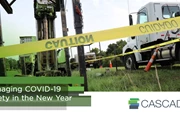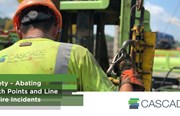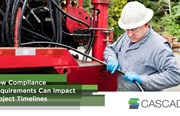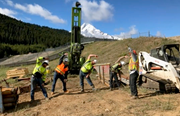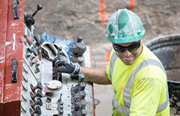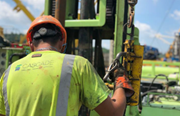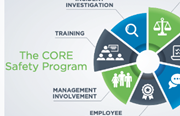Managing COVID-19 Safety in the New Year
By: Ken PostA new year can signal the start of new projects and initiatives, but it’s also a good time to consider what you need to carry forward from the past year, especially into 2021. To be proactive, this means we need to review the safety protocols and practices that kept people safe on project sites. This past year has had challenges and as we make our way through the global pandemic, there are a few additional practices we should all be reviewing and updating for 2021.
SET EXPECTATIONS ABOUT COVID PROTOCOLS
Hopefully you have already established expectations within your organization about how your teams should be staying safe on and off the project site, but have you introduced a way to track adherence? How do you know that you have compliance? When you track and review events within the organization, it provides a unique opportunity to learn, make improvements and continue to keep safety operating at the highest level.
SET GUIDELINES FOR POTENTIAL COVID EXPOSURE OR ILLNESS
Your employees need to know what to do if they discover they’ve been exposed to COVID or believe they may have contracted it. Don’t leave room for ambiguity—make it abundantly clear that they should stay home and follow the required protocol. Also clarify who, within the company, they should contact about their COVID-related absence, and identify any documentation they might be required to produce. Employees should additionally be instructed to follow the directives of their local health authority, along with any medical pre-screening or related follow up.
This is also a time when you should review your exposure management guidelines, contact tracing procedures and safety procedures to ensure you can alert other employees of their potential exposure so they can isolate appropriately.
COMMUNICATE ABOUT COVID
Just like with any other safety issue, you can’t set it and forget it when it comes to COVID. Not only do you need to clearly communicate safety protocols and proactively emphasize them, you must also regularly update the company about any state or city mandates that could impact operating procedures. Communicating expectations is a responsible business and safety practice, and it helps the team stay refreshed on the safety requirements. The beginning of the year is a great time to update requirements, alongside whenever conditions change. Refresher classes, training meetings and one-on-one conversations are an excellent way to continue educating the team and keeping them advised.
COMMUNICATE WITH CLIENTS
Your clients and shareholders are also concerned about COVID safety, and want to ensure that crews and any other personnel on site will be able to work safely. Make a point to regularly update your clients about the required protocol and best practices your teams maintain. It is important to ensure they understand the safety and compliance procedures that your organization will continue to follow and implement, even if conditions change.
IMPLEMENT A STOP WORK POLICY
If you don’t already have a stop work policy, this is the year to change that. Cascade has operated under such a policy since the inception of the company, and it is one of the reasons we are recognized year after year for our safety record. A stop work policy authorizes anyone on a project site to halt all work until a safety concern has been appropriately addressed, reviewed, and the hazard has been mitigated. If the person reporting the issue is acting in good faith but is mistaken about the hazard, it’s key there are no negative consequences for them, as it could cause employees to hesitate halting work in the future when the concern may be more justified.
Safety should always be the number one concern on any project site. Refining existing policies, procedures and best practices is an excellent way to get the year started off right and safely lead your team.

